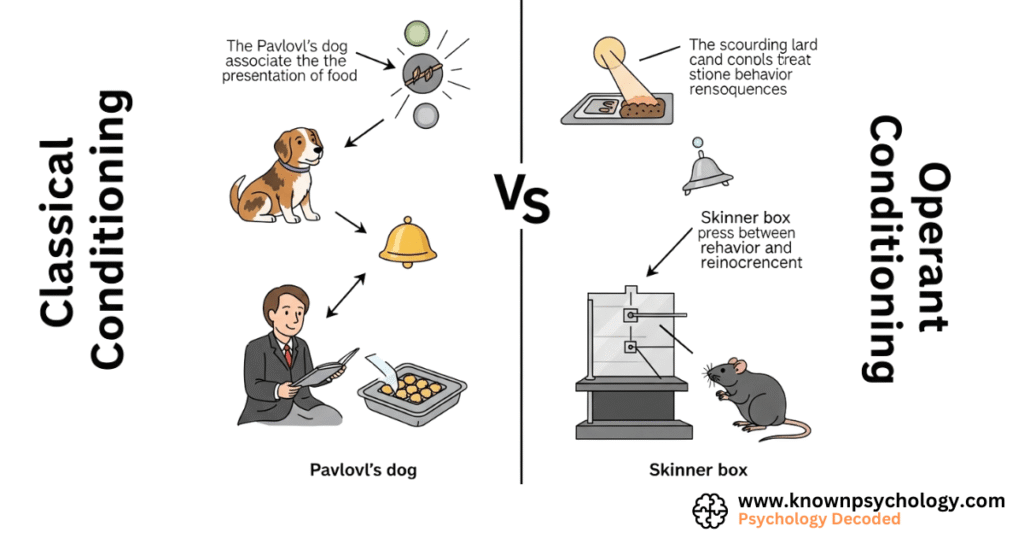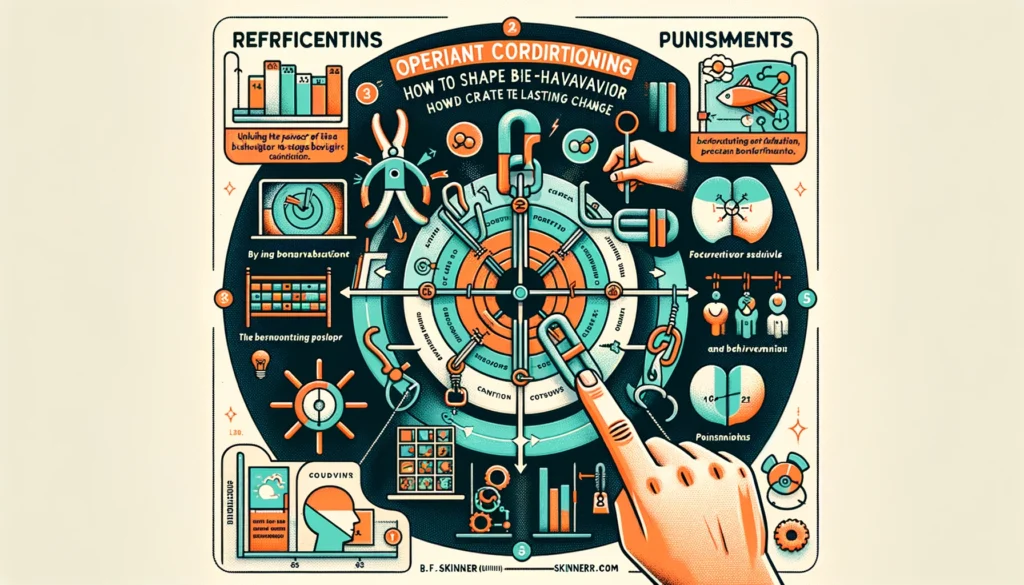Classical and operant conditioning are two key concepts in psychology that explain how we learn through experience. These ideas help us understand how behavior is shaped in both animals and humans. But what is the difference between classical and operant conditioning? Let’s explore both types and see how they work.

Key Takeaways
- Classical conditioning is learning by association between a neutral stimulus and a natural response.
- Operant conditioning is learning based on consequences — rewards increase behavior, punishments reduce it.
- Classical conditioning involves involuntary reactions, while operant conditioning involves voluntary actions.
- Ivan Pavlov discovered classical conditioning, and B.F. Skinner developed operant conditioning.
- Both types of learning help explain how humans and animals develop habits, emotions, and behaviors.
What is Classical Conditioning?
Classical conditioning is learning through association. It was first studied by Ivan Pavlov, a Russian scientist, who noticed that dogs would start to salivate when they saw food. Later, the dogs began salivating even when they heard the footsteps of the person bringing the food.
In simple terms, classical conditioning happens when a person or animal connects two things together:
- A neutral stimulus (like a sound)
- With something that naturally causes a reaction (like food causing salivation)
Example of Classical Conditioning:
If a child hears a bell every time they are given a sweet, they may start feeling happy just by hearing the bell, even when no sweet is given. That’s classical conditioning.
What is Operant Conditioning?
Operant conditioning is learning through consequences. This idea was developed by B.F. Skinner, an American psychologist. It focuses on how behavior changes based on rewards or punishments.
In operant conditioning, behavior is followed by:
- A reward to increase the behavior
- Or a punishment to decrease the behavior
Example of Operant Conditioning:
If a student gets praised for doing homework, they are more likely to do it again. If they are scolded for being late, they may try not to be late next time.
Classical vs Operant Conditioning: The Key Differences
Let’s break down the difference between classical and operant conditioning in a simple table:
| Feature | Classical Conditioning | Operant Conditioning |
| Discovered by | Ivan Pavlov | B.F. Skinner |
| Type of Learning | Learning through association | Learning through consequences |
| Behavior | Involuntary (automatic responses) | Voluntary (controlled responses) |
| Key Process | Stimulus before the behavior | Consequence after the behavior |
| Example | Bell → Salivation (Dog) | Reward for good grades → Study more |
When Do We Use Classical and Operant Conditioning?
Both types of learning happen in everyday life.
- Classical conditioning is used in advertising (associating products with positive feelings) or in phobias (associating a situation with fear).
- Operant conditioning is used in schools, workplaces, parenting, and animal training to encourage or discourage behaviors.
Understanding classical and operant conditioning helps teachers, parents, and even marketers know how to influence behavior.
Conclusion
So, what is the difference between classical and operant conditioning? Simply put:
- Classical conditioning teaches you to react to a signal.
- Operant conditioning teaches you to act based on consequences.
Both are powerful tools for learning and behavior change. Whether we are aware of it or not, these forms of conditioning are shaping our actions every day.
FAQs
1. What is the main difference between classical and operant conditioning?
The main difference is that classical conditioning involves learning through association, while operant conditioning involves learning through consequences (rewards or punishments).
2. Who discovered classical and operant conditioning?
- Classical conditioning was discovered by Ivan Pavlov through his experiments with dogs.
- Operant conditioning was developed by B.F. Skinner, who studied how rewards and punishments affect behavior.
3. Is classical or operant conditioning better for learning?
Both are useful in different situations. Classical conditioning is effective for emotional and automatic responses, while operant conditioning works well for teaching new behaviors and building good habits.
4. Can classical and operant conditioning work together?
Yes! In real life, both types of conditioning often work together. For example, a child might fear a teacher (classical) but still behave well to earn praise (operant).
5. What are some examples of classical vs operant conditioning?
- Classical: Hearing a song and feeling sad because it reminds you of something.
- Operant: Getting money for doing chores and continuing to do them regularly.
Mariam holds an MS in Sociology with a specialization in Medical Sociology and Social Psychology. With a strong academic background and extensive research work in both fields, she brings depth and clarity to complex topics. Her writing explores the intersection of society, health, and the human mind, making academic ideas easy to grasp and relevant to everyday life.


